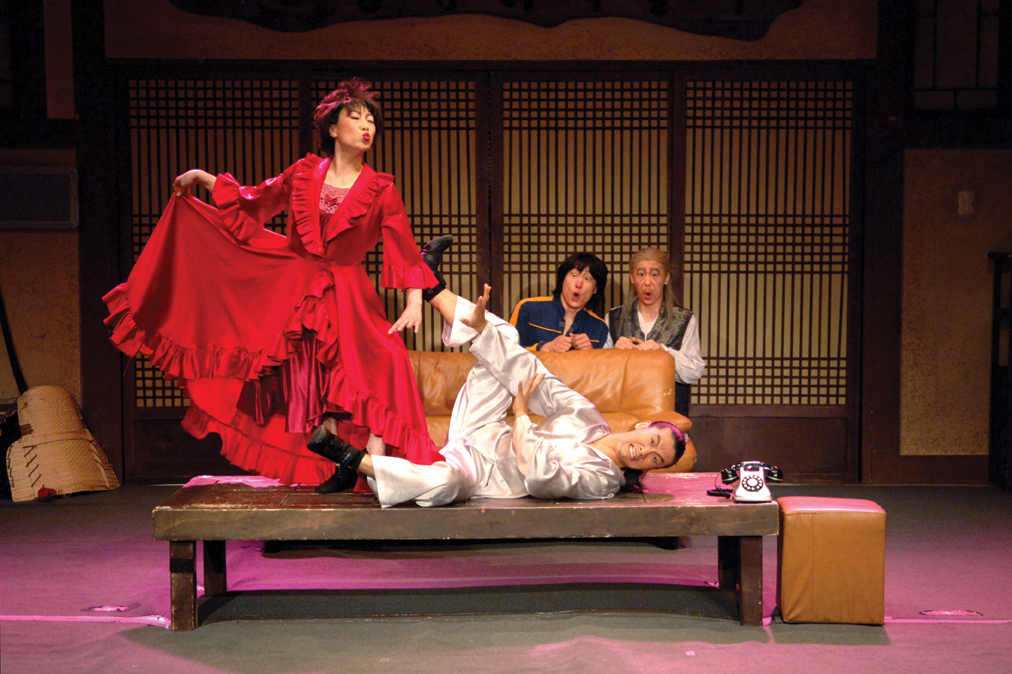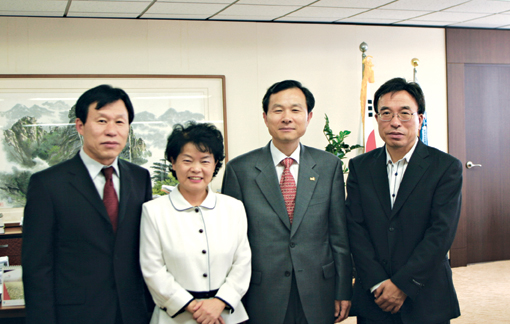KTO Seeks to
Proliferate Korean Wave
Strives to develop tourist products with more creative contents
 Oh Jee-chul, president & CEO of the Korea Tourism Organization, said his organization will continue the further development of Hallyu, or the Korean Wave, a popular culture trend that has been all the rage across the Asian region in recent years.
Oh Jee-chul, president & CEO of the Korea Tourism Organization, said his organization will continue the further development of Hallyu, or the Korean Wave, a popular culture trend that has been all the rage across the Asian region in recent years.
Shrugging off misgivings that Hallyu might subside, Oh said, "The Korean Wave still has a competitive edge as one of Korea's significant tourism assets."
Inbound foreign tourists coming to Korea specifically to appreciate the essence of Korean traditional culture are limited to a few, high-level Korean culture aficionados, just as the number Korean tourists wanting to watch only Japanese traditional culture such as Kabuki are few. Thus, Korean dramas and music, based on a combination of Asian traditional values and American-style dynamics and diverse genres, have been all the rage across Asia in the past decade and have served as a magnet for attracting tourists, he said. "Even though some are frustrated over the recent sag in Hallyu's popularity,
 pop culture trends normally have ups and downs,"Oh said.
pop culture trends normally have ups and downs,"Oh said.
"It is up to us to keep on developing Hallyu into something with creative contents that can appeal to Asian people with a business-oriented mindset,"he said.
KTO, making the most of the Korean Wave, has been striving to develop value-added Hallyu tourist products by expanding into other arenas, departing from its focus on dramas and cinemas. It is working on the development of tourist products related to such areas as dining, beauty, plastic surgery and fashion, on top of drama and cinema locations. In particular, KTO is putting more energy into developing such creative and imaginative contents as non-verbal fusion concerts like B-Boy, Nanta and Jump by staying away from its past focus on stars as part of its efforts to proliferate Hallyu.
Oh noted that the Korean culture's embrace of foreign things may be a way of keeping Hallyu thriving for the long-term, just as the United States and France export their own culture
 after accepting parts of other cultures from around the world. To this end, he added, the most important thing Korea has to do is promote cultural exchanges in order to make Hallyu a long-lived force, so Korea needs to embrace culture from Vietnam, Indonesia, China and Japan, specifically even Okinawa.
after accepting parts of other cultures from around the world. To this end, he added, the most important thing Korea has to do is promote cultural exchanges in order to make Hallyu a long-lived force, so Korea needs to embrace culture from Vietnam, Indonesia, China and Japan, specifically even Okinawa.
He stressed that the outbound tourism industry is as important as the inbound tourism industry in a bid to help Korea promote exchanges with foreign countries, adding that Japan maintains a policy of "Visit the World"as well as its "Visit Japan"concept until the number of outbound tourists reaches the 20 million barrier, as Japan learned a valuable historical lesson when they sent their citizens abroad to learn foreign things since the Meiji Reform.
Stats released by the KTO showed that inbound foreign travelers were tallied at 6,448,241 during 2007, a 4.8 percent rise from 2006, placing Korea 36th in the world. Japanese tourists topped the list with 2,235,963 visitors to Korea, a 4.4 percent drop from 2006,
 followed by Chinese (1,068,925, a 19.2 percent surge) and Americans (710,336, a 6 percent rise). Inbound foreign travelers totaled 4,437,000 in the first eight months of this year, representing a 7.5 percent rise over the same period of last year. In contrast, overseas Korean travelers were tallied at 8,870,000 in 2007, a 2.3 percent drop from a year earlier, due to the sluggishness of the national economy.
followed by Chinese (1,068,925, a 19.2 percent surge) and Americans (710,336, a 6 percent rise). Inbound foreign travelers totaled 4,437,000 in the first eight months of this year, representing a 7.5 percent rise over the same period of last year. In contrast, overseas Korean travelers were tallied at 8,870,000 in 2007, a 2.3 percent drop from a year earlier, due to the sluggishness of the national economy.
Oh said the KTO aims to attract a target of 7 million inbound travelers during the whole of the year.
The Korean tourism industry has such weak points as access problems, cultural similarities to Japan and China and lower price competitiveness.
He added that Korea needs to make a foreigner-friendly environment in which foreign tourists feel at home. For instance, he recalled how all staff of the Don Muang International Airport in Bangkok, ranging from customs officials to immigration officers, made foreign tourist feel at ease during the 1970s.
KTO is devoting its attention to exploring the four
 largest emerging markets -- China, expected to replace Japan as Korea's largest inbound market in a few years, India, Russia and once-Soviet bloc Eastern European countries, said Oh. He added that his organization is turning to Latin American countries in the long-term, including Sao Paulo, Brazil, to which Korean Air has launched direct flights.
largest emerging markets -- China, expected to replace Japan as Korea's largest inbound market in a few years, India, Russia and once-Soviet bloc Eastern European countries, said Oh. He added that his organization is turning to Latin American countries in the long-term, including Sao Paulo, Brazil, to which Korean Air has launched direct flights.
It is stepping up on-line publicity activities tailored to meet the needs of foreign independent travelers (FITs), said Oh, adding that FIT travelers outnumber group travelers at a ratio of 6:4.
He said KTO is trying to explore the value-added medical tourism market in order to attract travelers with deep pockets from the Far East, China and the United States, including Korean-Americans who have to pay big bills for medical treatments that aren's covered by insurance. KTO is turning to such niche markets as health checks, dental services and plastic surgery as well as therapies combining Western and Oriental medical services like acupuncture.
KTO is also throwing its heart and soul into fostering the Meeting, Incentives, Convention and Exhibition (MICE) sector that countries have been scrambling to develop as a value-added industry.
"Korea has many convention centers in place across the nation, and KINTEX has already established itself as an exhibition center of international scale with an exhibition size of 30,000 sq. meters, albeit still smaller than its counterparts in Germany,"said Oh.
He added that efforts to attract conventions have paid off. Statistics released by KTO show that Korea placed 15th in the world and 3rd in Asia in 2007 when the nation hosted 268 conventions. Korea has been awarded the rights to host the 2009 Herbal Life Annual Meeting, which is expected to attract about 35,000 people, and the 2016 Rotary Club Annual Meeting for which some 50,000 people from around the world will converge in Korea.
Oh said incentive tours are considered to be valued-added as their participants are given more benefits, including higher-rated hotel accommodations. nw
KTO President Oh Jee-chul
(clockwise) The popular Nanta, the Ballerina Who Loves a B-Boy, and a scene of Jump, a comic martial arts performance.
KTO President Oh and KTO Spokesman Shim Jeong-bo pose with NewsWorld President-Publisher Elizabeth M. Oh and managing editor George Kim.
3Fl, 292-47, Shindang 6-dong, Chung-gu, Seoul, Korea 100-456
Tel : 82-2-2235-6114 / Fax : 82-2-2235-0799